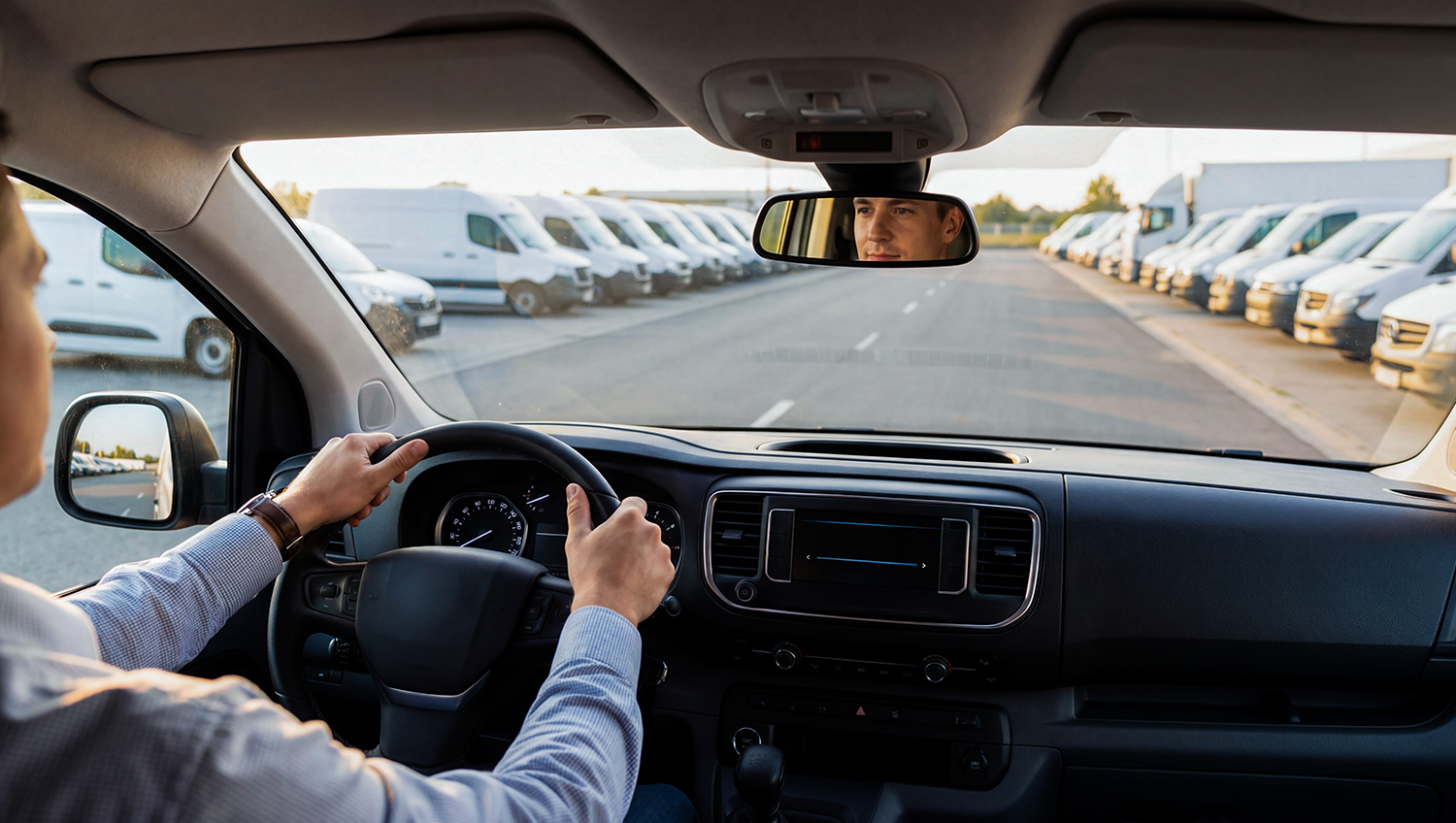Location Tracker for Vehicles — A Complete Guide to Smarter Driving
Keeping track of your vehicle’s location is no longer just about peace of mind. Whether you’re managing a business fleet, monitoring a teen driver, or simply want to improve your driving habits, a location tracker provides real-time visibility and insights you can act on.
In this guide, we’ll cover what a vehicle location tracker is, how it works, and why it’s becoming an essential tool for drivers and businesses. We’ll also review the different types of trackers, key features to look for, and why Bouncie stands out as one of the best options for everyday use.
What Is a Location Tracker for Vehicles?
A vehicle location tracker is a device that monitors the position of a car, truck, or other vehicle in real time. Unlike standard GPS navigation systems, which provide directions from Point A to Point B, location trackers continuously transmit the vehicle’s position to a secure app or web portal.
This distinction matters. A GPS location tracker offers:
- Live vehicle monitoring: Know exactly where a car is at any moment.
- Trip visibility: Review past routes and travel times.
- Alerts and reporting: Receive notifications for unsafe driving, geofence breaches, or impact events.
Families use them to keep teen drivers safe. Businesses rely on them to oversee fleets and improve efficiency. Even individual drivers install them for theft protection, mileage tracking, and smarter vehicle management.
How Do Vehicle Location Trackers Work?
Most car location trackers combine two key technologies:
- GPS satellites: Determine the vehicle’s location with precision.
- Cellular communication: Transmits data to your smartphone or computer in real time.
This allows for:
- Real-time tracking: Refresh rates as fast as every few seconds so you always know where a vehicle is.
- Data logging: Reviewing trip history, including mileage, stops, and routes.
- Advanced features: Like geofencing (which is the ability to set virtual boundaries), impact detection, and vehicle diagnostics.
By merging GPS accuracy with cellular connectivity, modern vehicle location trackers provide reliable updates whether the car is across town or across the country.
Now that you understand how a location tracker functions, let’s look at the different types available.
Types of Vehicle Location Trackers
Not all trackers are created equal. Choosing the right one depends on your purpose, whether you want plug-and-play convenience, portability, or long-term hidden installation.
OBD2 Plug-In Trackers
How they work: Plug into the vehicle’s OBD2 port (which is standard on cars built after 1996).
Pros:
- Always has power (no recharging required)
- Easy setup with installation in seconds
- Additional vehicle data (engine diagnostics, battery health)
Cons:
- Visible under the dashboard, making them easier to find
Battery-Powered Portable Trackers
How they work: Standalone devices with internal rechargeable batteries.
Pros:
- Portable and easy to move between vehicles
- Can be discreetly hidden
Cons:
- Require regular charging
- Limited runtime between charges
Hardwired Trackers
How they work: Installed directly into the car’s wiring system.
Pros:
- Hidden for better anti-theft protection
- Consistent power supply
Cons:
- Requires professional installation
- Less convenient if you need to move the device between vehicles
Choosing the Right Type of Location Tracker
Now that you know the different tracker formats, how do you decide which one fits your needs? Use these key differences to guide your decision:
- OBD2 Trackers: Ideal for most drivers. They’re simple to install, always powered, and provide diagnostic data like engine codes and battery health. They’re best for families, gig workers, and small fleets needing reliable, plug-and-play functionality.
- Battery-Powered Trackers: These are portable and easy to hide, making them useful for temporary tracking or shared vehicles. However, they require frequent recharging and often have slower refresh rates.
- Hardwired Trackers: Designed for long-term use. They stay hidden, making them effective for theft prevention or corporate fleets. They require professional installation, which adds cost and reduces portability.
Understanding your priorities like convenience, stealth, or detailed vehicle health data will help you select the right tracker.
Benefits of Using a Vehicle Location Tracker
The value of a location tracker goes far beyond knowing where your car is. A location tracker can also provide peace of mind, reduce costs, and streamline operations.
For Families
- Teen driver safety: Monitor driving behavior (speed, braking, acceleration) and set alerts for curfew or boundary violations.
- Peace of mind: Quickly check that loved ones have arrived safely.
Want to help your teen become a safer driver? A Parent’s Guide to Bouncie: Helping Teen Drivers Build Safer Habits offers tips on using GPS insights for real-world coaching.
For Businesses
- Fleet oversight: Improve route efficiency, reduce fuel use, and hold drivers accountable.
- Trip reporting: Use mileage logs for expense tracking and compliance.
- Reduced downtime: Plan maintenance based on actual vehicle usage.
For a deeper look at how GPS tracking benefits small operations, read GPS Tracking for Fleets: What Small Fleet Operators Need to Know.
For Individuals
- Theft recovery: Quickly locate a stolen vehicle.
- Trip logging: Track mileage for personal budgeting or insurance.
- Maintenance planning: Use mileage and diagnostic data to avoid costly breakdowns.
Curious how to get started with GPS tracking? How to Track a Car: A Complete Guide for GPS Tracking breaks it down step by step.
What to Look for in a Location Tracker for Vehicles
Not all trackers offer the same level of performance. Here’s what you should prioritize:
- Fast Refresh Rates: Real-time updates are essential for accurate monitoring.
- Geofencing: Set virtual boundaries and get alerts when they’re crossed.
- Customizable Alerts: Speeding, hard braking, late-night driving, and more.
- Mobile App Access: Track vehicles on the go with iOS or Android apps.
- Diagnostics & Maintenance Alerts: For OBD2 trackers, this adds significant value.
- Scalable Solutions: Online portals for managing multiple vehicles.
- Detailed Reporting: Details like Distance Driven and Fuel Used are helpful.
- Affordable Subscription Plans: Understand what’s included in the monthly cost.
Why Bouncie Is the Best Location Tracker for Vehicles
Bouncie is a car location tracker designed to meet the needs of both individual drivers and businesses. Bouncie combines these features with an intuitive app and affordable plans, making it one of the most practical GPS location trackers available today.
Key Features:
- Plug-and-Go Setup: Install in seconds via the OBD2 port.
- Real-Time Tracking: Updates every second while driving.
- Trip History & Mileage Logs: Access past trips with detailed data.
- Geo-Zones: Set custom boundaries for curfews, work zones, or delivery areas.
- Driver Behavior Monitoring: Review speeding, rapid acceleration, and hard braking events.
- Vehicle Health Monitoring: Get engine codes, battery status, and maintenance reminders.
- Impact Detection: Automatic alerts in the event of an impact.
For Families:
Curfew alerts and safe-driving data help keep teen drivers accountable.
For Businesses:
Detailed trip reports and an easy-to-use online portal simplify fleet management.
How to Set Up and Customize Your Location Tracker
Installing and customizing a location tracker like Bouncie is quick and straightforward. Here’s how to get started:
- Download the App: Install the Bouncie app on your phone or access it via the web portal.
- Plug in the Device: For OBD2 trackers like Bouncie, locate the port under your dashboard and insert the device. It powers on automatically.
- Register Your Vehicle: Enter basic information like your car’s make, model, and VIN to sync the device.
- Set Up Alerts: Customize notifications for speeding, geofences, curfew hours, and impact events.
- Tag Trips: Categorize trips as business, personal, or other for clear reporting.
Within minutes, you’ll see live updates and can adjust settings anytime for your needs.
How Drivers Use Bouncie
Parents of Teen Drivers
A mom installs Bouncie in her son’s car. She receives alerts when he exceeds speed limits and sets up Geo-Zones for school and work. Trip summaries help her coach safer driving habits, turning data into constructive conversations.
Fleet Managers
A delivery company installs Bouncie in 10 vans. The manager reviews route data to reduce unnecessary mileage and sets up maintenance reminders based on actual usage, reducing downtime and repair costs.
Small Business Owners
A landscaping company knows where their team is in real time, which helps manage schedules, reduce wasted miles, and keep customers informed.
Gig Economy Drivers
A rideshare driver can log trips automatically for mileage reimbursements, tax deductions, and personal accountability.
Car-Sharing Hosts
A driver lists his car on Turo. With Bouncie, he monitors guest mileage in real time and ensures renters adhere to agreed limits. If the car travels outside approved Geo-Zones, he receives immediate alerts.
Common Mistakes When Choosing a Location Tracker
Many first-time buyers make the same errors when choosing a vehicle location tracker. Understanding these pitfalls can save time, money, and frustration.
- Focusing only on price: Cheaper devices often have slower refresh rates or limited features.
- Overlooking data privacy: Ensure your tracker encrypts data and provides secure access controls.
- Ignoring subscription terms: Some “no-fee” trackers cut corners on speed or reliability.
- Choosing the wrong form of device: A portable tracker may not suit long-term fleet oversight, while a hardwired device may be overkill for casual users.
Data Privacy and Sharing
A car location tracker collects valuable data, which is why privacy matters. Bouncie protects your information with encrypted storage and secure cloud connections.
Only authorized users can access trip data, and sharing access (for family members, co-managers, or team leaders) is fully customizable. Whether you’re monitoring one car or a full fleet, you control who sees what.
Frequently Asked Questions
Does Bouncie work when the vehicle is turned off?
Yes, Bouncie can report parked locations even when the engine is off.
How accurate is the location tracking?
Bouncie uses GPS with cellular transmission for highly accurate data, typically within a few feet.
Can I monitor multiple vehicles from one account?
Yes. Bouncie supports multiple vehicles under a single login, making it ideal for families, small businesses, and fleets.
What happens if the device is unplugged?
You’ll receive a notification if the device loses power or is removed.
Is there a subscription fee?
Yes, Bouncie offers affordable monthly plans that cover cellular data and cloud storage.
Can I share vehicle tracking access?
Yes. You can grant access to managers, family members, or team leaders using customizable permissions.
What Makes a Great Location Tracker?
A location tracker does more than just show a dot on a map. It gives you the full context to drive smarter, protect what matters, and stay in control.
For families, it’s about safety. For businesses, it’s about visibility and accountability. For individuals, it’s about confidence and peace of mind.
Bouncie combines ease of use with powerful features, making it one of the best location tracker options for everyday drivers and fleet operators alike.
Ready to take the guesswork out of driving? Start tracking with Bouncie today.


